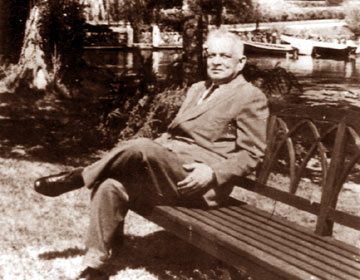
Introductory passage is provided by this website and may not represent the views of the archived document's author. BACK 
Search the Republic of Rumi |
|
|
Iskander Mirza's letter to the Editor of The Times, London
Iskander Mirza's letter to the Editor of The Times, London 13th September, 1967 The Editor, Sir, In your issue of September 4th 1967, extracts from a Book written by the present President of Pakistan contain certain allegations against me which leave me no alternative but to reply to keep the record straight. I shall be grateful if you will spare me, the last Governor-General and first elected President of Pakistan, space for this purpose. At the outset, I assure you I bear no ill will or animosity against anyone, nor I have any intention or desire to enter in a controversy. What I am writing will be amplified in a factual book, begun some time back, but which I have not, so far, been able to advance adequately, owing to two severe heart attacks in the last year. Innuendos and attacks of the nature which have found their way into the extracts printed in your newspaper I must refute: they are not only inaccurate, but are based on trumped up reports by men like Air Commodore Rab. This person considered the military control of the time a God-given opportunity to wreak vengeance for his supersession in the command of the Pakistan Air Force, by Air Commodore Azghar Khan (now Air Marshal). For this bit of work Rab was amply rewarded. He was drafted into the Foreign Office and appointed Chief of Protocol; after a brief period. He was named Pakistan's Ambassador to Turkey, and, later to Lebanon, an assignment he still holds. There were four Generals in the Cabinet at the time, Ayub, Sheikh, Azam, and Burki, three very close to Ayub. I would ask any reasonable man to consider what I could hope to achieve by the arrest of the three Generals Yahya, Hamid and Sher Bahadur? Yehya and Hamid were on the General Staff and should have been in Rawalpindi at the time I am supposed to have ordered or requested their arrest. Sher Bahadur was in Karachi as Director of Military Intelligence and at that time most of his efforts were directed towards internal security as the country was under Martial Law. A person possessing average wit would regard a request or order to an Air Force Officer to arrest two Generals in Rawalpindi about 700 miles from Karachi, or a General in Karachi in the midst of an area in which at least one Infantry Brigade was deployed within immediate striking, distance, as an act of a deranged mind, or consider it to be a Fakir's Fairy Tale. What makes the assertion more absurd in that I am supposed to have issued orders over the Telephone, at a time the Lines of all those who counted in the Country, including the Presidents', were being systematically tapped. If I had harbored any self-interest, would I have initiated the Revolution? There was nothing easier for me than to sit back, do nothing, and remain President of Pakistan. If the Revolution of October 7th 1958, had failed, and no amount of letter writing could convert an illegality into legality, I should have been the only person who would have been shot. I took the calculated risk because, in my judgment there was no other course left if the country was to be saved. In the Proclamation of October 7th 1958, which I drafted and issued, I could easily have retained all powers in my own hands. I had no desire to be a dictator. My cardinal error was that, I trusted persons whom I knew, and helped, for twenty years; I regarded them as reliable and trustworthy friends. A letter from General Ayub Khan, written in April 1958, will prove I had no cause to suspect his loyalty, and want of faith:
I must express my deep regret that, even my wife, who devoted all her time to social work, and to enhancing the prestige of the President's House, has not been spared. I categorically deny that she asked me to get rid of General Ayub Khan. There was absolutely no reason for her to do so. The allegation only proves that, there was someone in the President's House base enough to fabricate tales in the hope of improving his situation. A man of honor would not take upon himself the task of a spy in the household of Ms Head of State. Several experienced men, among them leading politicians, repeatedly advised me not to grant extension after extension of service periods to the Chiefs of the Defense Forces, saying it was a dangerous practice, unknown in Great Britain, U.S.A. and some other great countries. I did not accept their view, believing that, in our country, an exception had to be made. Events which followed one particular extension proved, conclusively, the error of my judgment in not accepting good counsel. All the accounts of the talks from 5th December, to the time of the Military coup d'stat, given in your extracts, have no basis. Why should I get apprehensive if General Ayub addressed a large crowd in Dacca? In an area where 55 million inhabitants are concentrated in 50,000 square miles, crowds are normally to be seen or can be collected. When I was Governor of East Bengal, I addressed large crowds in several places at difficult times, and, the then Central Government did not dream of suspecting my loyalty. There is no logic in all this, and, I do not desire unnecessarily to exhaust the patience of readers by discussing matters of little consequence, and lose relevance to history. Yours truly, Iskander Mirza Source: Iskander Mirza Speaks (Speeches, Statements
and Private Papers) Back to Top

Search the Republic of Rumi
|
| Page Hits | Visitors | BACK | HOME | CONTACT |
